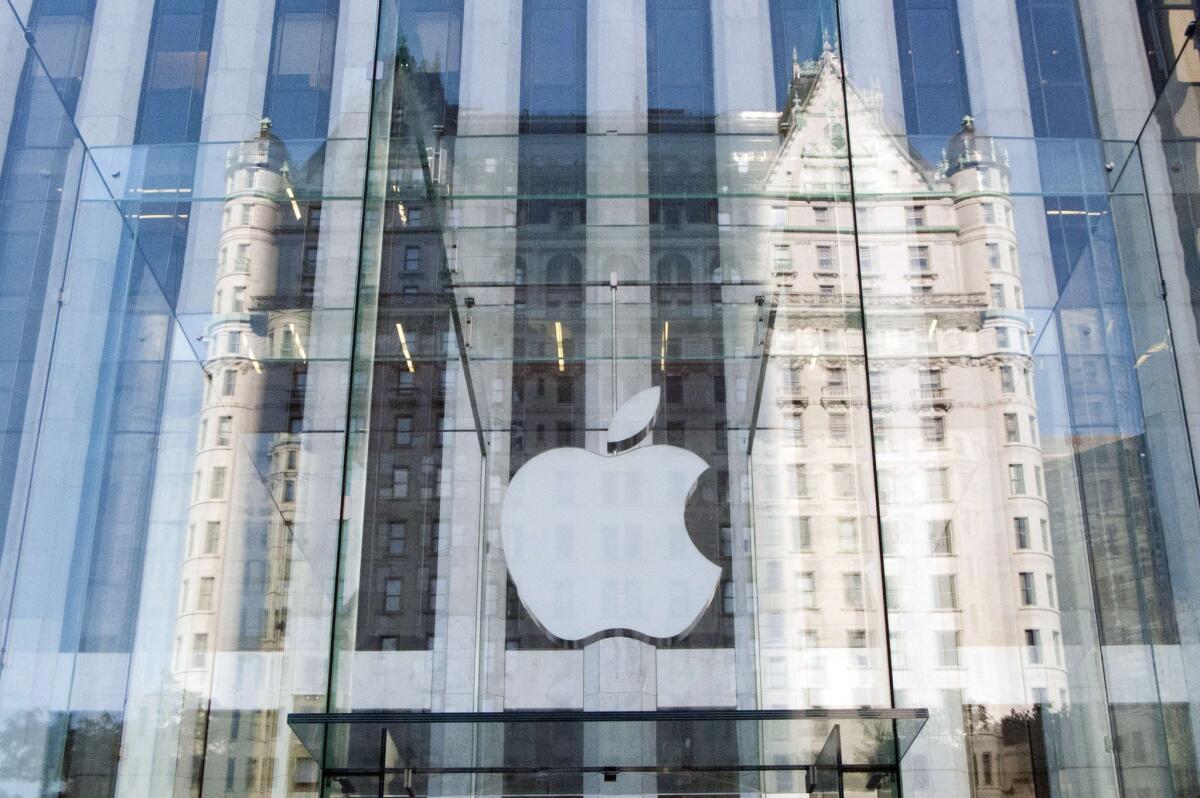Apple ordered to pay $532.9 million for violating patents

- Share via
Apple Inc. has been ordered to pay $532.9 million after a federal jury ruled that it willfully infringed on intellectual property owned by a Texas patent licensing company and used on Apple’s iTunes.
The company, Smartflash LLC, holds patents that cover methods of managing digital rights and paying for songs, games and other data. The jury in Tyler, Texas, decided late Tuesday that Apple infringed on three Smartflash patents.
Smartflash alleged that one of the co-inventors of the patents, Patrick Racz, discussed the data management technology in 2000 with Augustin Farrugia, who went on to become a senior director at Apple, according to Smartflash’s complaint.
An Apple spokeswoman said the company will appeal the ruling.
“Smartflash makes no products, has no employees, creates no jobs, has no U.S. presence, and is exploiting our patent system to seek royalties for technology Apple invented,” Apple said in a statement. “We refused to pay off this company for the ideas our employees spent years innovating and unfortunately we have been left with no choice but to take this fight up through the court system.”
The case is just the latest to raise questions about what many have called a broken U.S. patent system. Last year 5,020 patent cases were filed in U.S. district courts, nearly double the 2,580 that were filed in 2009.
Companies large and small gripe about having spent tens of millions to defend against lawsuits and bring ones of their own, leading to a costly and time-consuming endeavor that can span years for a single case.
“The more they get sued, the more they pay out, the more their profits get hurt, the more they charge their customers,” said Raymond Persino, a patent lawyer at Jefferson IP Law in Washington, D.C. who also worked as a patent examiner for seven years. “So the costs get passed on to everybody.”
Legal experts say the laws exist to help companies protect valuable intellectual property. This works particularly well for pharmaceutical companies, which expend millions of dollars and time to develop new drugs that can easily be copied. Having a patent “gives the company the incentive, the comfort, to invest in that research,” Persino said.
“Patent troll is a term that is thrown out too much,” said Jim Bergman, an intellectual property expert at financial advisory and consulting firm Conway MacKenzie. “There are plenty of cases in which that may be an appropriate term, but there are legitimate nonpracticing entities that hold valuable patent assets that have the right to enforce them.”
But too often, critics say patent laws are instead used to lay claim to overly broad technologies and to subsequently litigate with the aim of driving rivals out of business.
The U.S. District Court for the Eastern District of Texas, has emerged as a popular venue for patent disputes with its reputation for speedy trials and juries willing to side with plaintiffs.
Court and regulatory filings show that Apple has faced more than 100 lawsuits in recent years from so-called patent trolls, companies that threaten to file patent lawsuits unless they receive royalty payments.
Apple has had some luck fighting such cases in court: At least two other high-profile patent decisions against Apple from East Texas have been reversed on appeal.
A Tyler jury in October 2010 ordered Apple to pay $625.5 million for infringing on patents owned by Mirror Worlds LLC. A judge later overturned that verdict.
A federal appeals court in 2014 threw out a jury order requiring Apple to pay VirnetX Holding Corp. $368.2 million in damages for violating its patents.
“We rely on the patent system to protect real innovation and this case is one more example of why we feel so strongly Congress should enact meaningful patent reform,” Apple said in a statement.
John Austin Curry, an attorney for Smartflash, disputed the notion that the company was simply a patent troll. He said Patrick Racz, one of the co-inventor of the patents, had attempted to launch a line of products in the late 1990s but the business venture fell through. Racz did “the prudent thing,” Curry said, and filed for patent protection.
Smartflash, which Curry contended has no employees, serves primarily to protect the patents. Smartflash also has suits open against Google, Amazon, and Samsung for violating the same patents.
“Apple is very bitter about the outcome,” he said. “They are talking about the broken system, but they wouldn’t be saying that if they had won.”
Twitter: @jpanzar @byandreachang








